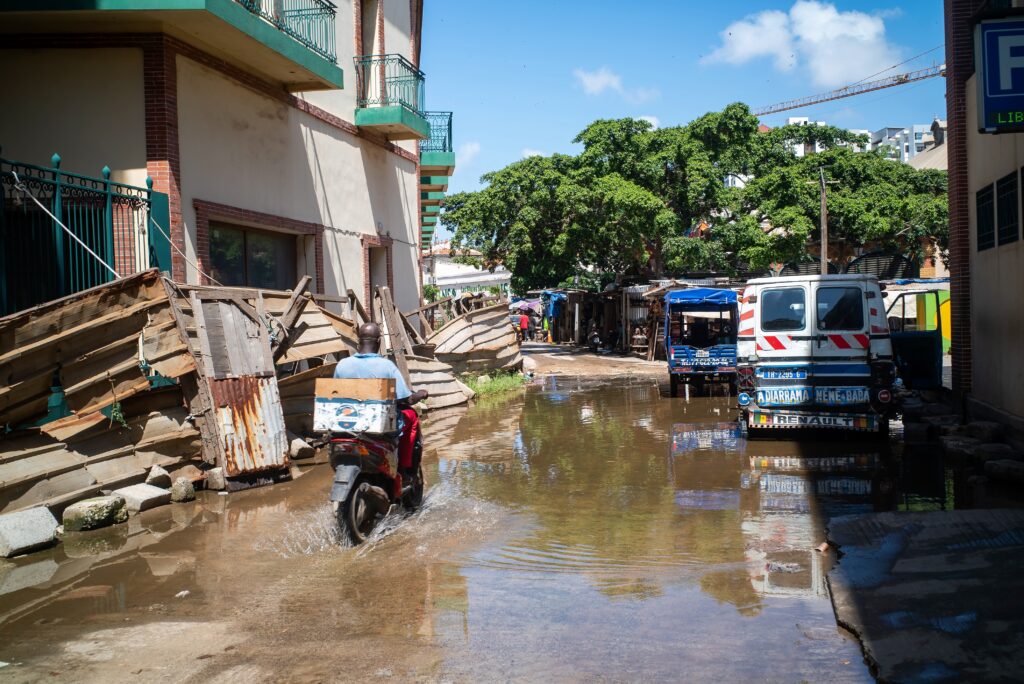Data-Pop Alliance (DPA) is proud to announce a new $350,000 USD grant from the Patrick J. McGovern Foundation (PJMF) to accelerate the development of OPAL for Humanitarian Action (OPAL4HA) to improve response to flooding in Senegal and beyond. This is the third consecutive grant from PJMF, after two grants totaling $700,000 in 2022 and 2023 to support our Data Feminism Program, our Technology and Democracy Program, and the initial development of OPAL4HA. This new grant, which complements funding from the World Food Program Innovation Accelerator and the Belmont Forum through the CLIMB Project for OPAL4HA, is meant to allow us to develop a full Minimum Viable Product in time for the next rainy season in Senegal.
Flooding in Senegal
There are several reasons why OPAL4HA focuses on addressing flooding in Senegal. Floods are among the most common natural hazards, affecting about 23% of the global population, with the vast majority living in low- and middle-income countries (Rentschler et al., 2022). Secondly, through our work over the past five years in Senegal, we have gained a deep understanding of the devastating impacts that floods have on the country. Flooding has claimed numerous lives, displaced thousands, wreaked havoc on homes and livelihoods, and disproportionately affected vulnerable populations—including women, children, and the elderly. According to the World Bank, Senegal faces the grim prospect of losing up to 8% of its GDP by 2030 due to the impacts of climate change. To learn more, read this recently published New York Times piece “Water is Coming’: Floods Devastate West and Central Africa”. Amid this landscape, leveraging the OPAL framework to tackle these challenges became imperative.
OPAL for Humanitarian Action (OPAL4HA)
OPAL is a general framework for allowing the safe access to and analysis of sensitive data and other data sources developed out of research that originated at MIT, which was piloted with telecom operators’ data in Colombia and Senegal starting in 2017; it consists of two key components: Privacy-safe architecture and a participatory governance system.
These components work together to address humanitarian challenges by ethically gathering evidence-based insights and providing a forum to local stakeholders for policy and decision-making. Thanks to previous PJMF funding and support from other partners, DPA was able to conduct research to map the main difficulties faced by the Senegalese government and humanitarian organizations in responding to floods. We identified three critical areas:
- The need for better data and tools to prepare for, monitor, and coordinate flood response.
- The need to improve skills in using innovative data sources.
- The need to enhance communication and coordination among actors and actions.
This Year’s PJMF Grant: Next Steps
As mentioned above, the primary focus of OPAL4HA, based on the OPAL approach, is to enable a more effective response to floods in Senegal. To achieve this, the new platform aims to provide access to critical data, provide actionable insights through generative AI, and enhance coordination between humanitarian actors and local communities. With this latest grant, DPA will build on earlier progress and by launching a Minimum Viable Product (MVP) of the platform in time for Senegal’s rainy season (August to October).
It is important to highlight that this next phase of OPAL4HA will incorporate gender-informed methodologies to ensure a comprehensive understanding of how crises impact diverse groups. Additionally, the grant will allow us to refine OPAL4HA’s capabilities, including the integration of real-time, high-resolution data from sources like satellite imagery and mobile phone metadata, and leveraging existing local solutions that might contribute to our goal while empowering local actors.
The Vision
Through partnerships with local and international stakeholders, DPA envisions creating a platform adaptable to various crises, empowering communities with data that matters most to them. PJMF President Vilas Dhar and DPA Director and Co-Founder Emmanuel Letouzé share their thoughts below.
PJMF’s continued support highlights our shared vision of leveraging technology and data to drive positive social change, addressing issues such as gender inequality, threats to democracy, and the impacts of climate change and economic challenges.
About the Patrick J. McGovern Foundation

The Patrick J. McGovern Foundation (PJMF) is a philanthropic organization dedicated to advancing artificial intelligence and data science solutions to create a thriving, equitable, and sustainable future for all. PJMF works in partnership with public, private, and social institutions to drive progress on our most pressing challenges, including digital health, climate change, broad digital access, and data maturity in the social sector.
Learn More

For more information about OPAL4HA, click the button below:





![M002 - Feature Blog Post [WEB]](https://datapopalliance.org/wp-content/uploads/2025/10/M002-Feature-Blog-Post-WEB.png)





